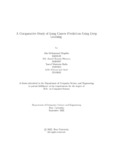A comparative study of lung cancer prediction using deep learning
Abstract
At the point when cells in the body develop out of control, this is alluded to as
cancerous development. Lung cancer is the term used to depict cancer that starts
in the lungs. At first in the field, classifier-based approaches are joined with various
division calculations to utilize picture acknowledgment to recognize lung cancer
nodules. This study found that CT scan images are more reasonable for delivering
improved results than other imaging modalities. The use of the images is a piece of
chiefly inspecting the CT scanned images that are viewed as informational collections
for patients affected by lung cancer. The suggestion of our paper exclusively
centers around the execution of concentrating on the calculation’s accuracy in diagnosing
lung cancer. Thus, the primary plan of our examination is to utilize examined
calculations to conclude which strategy is the most efficient method for detecting
lung cancer initially. After training the model we found that Over all accuracy of
Resnet-18 is 99.54%, the Overall accuracy of Vgg-19 is 96.35%, The overall accuracy
of MobileNet V2 is 98.17%, Dense Net161 is 99.09% and Inception V3 is 98.17%.
So we can see that ResNet18 perform better than other train model.

